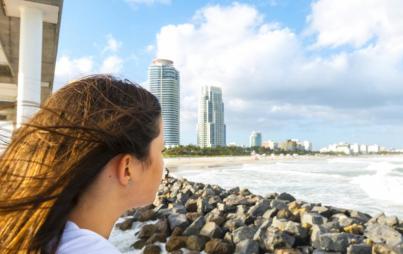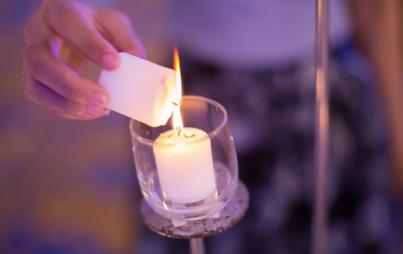
Emotionally, there were times I longed for a hint of my Salvadoran heritage in my name.
I'll never forget my French teacher's reaction when I asked her to sign a form to let me join a college tour for multicultural students. It was a trip the high school's multicultural counselor organized every year. My teacher looked down at the form suspiciously and asked what minority I was. When I (shyly) said Latina, she scoffed and replied, "Latina? But Stoddard isn't a Spanish name!" She signed the form and handed it back to me. All of my excitement for the trip melted in an instant because of her swift dismissal.
Plenty of Americans have names that don't convey their full cultural background because, at this point, so many of us are mixed up. How could our names possibly communicate all that we are? But when the time comes for an interracial, interethnic, international couple to name their child, they're often faced with a political decision. Will Mom and Dad give their child a name that connotes privilege and Americana? Or will they choose a name nativists will deem "un-American" or "too ethnic"? Or will Mom and Dad find a compromise? What will motivate their decision?
My mother, who is a Salvadoran immigrant, was insistent that my sisters and I take our father's Scottish last name and have Anglo first and middle names.
She wanted our names to sound “American” so we wouldn't stand out.
She never wanted us to get teased or worse, discriminated against, for having Spanish names English-speakers couldn't pronounce. She saw this naming decision as a way of protecting us from harm, as much as it was a way for her assimilate into American culture. She was proud to be an American and wanted to show it.
Having a child would be one of my mother’s first major achievements as a new American. She had only come to the U.S. a couple of years before I, her oldest daughter, was born, and she had done so to start a family. She married my American father and hoped to create an American home for her American children. She would never forget her Salvadoran roots and still missed her homeland, but El Salvador was a country ravaged by war. Coming to the United States represented her new start after experiencing so much turmoil. Historically, my mother’s naming decision isn’t unprecedented.
Just look to the Americanization of immigrant names that happened at Ellis Island. Legend has it that scores of European immigrants had their names curtailed or simplified by American clerks. In an age of rampant Anti-Semitism, many Jewish families changed their names to hide their Jewish roots. They wanted to avoid the same discrimination my mother feared for my sisters and me. Still, even if I intellectually understood my mother’s reasons for bestowing us with such American names, I didn’t totally accept her decision.
Children may still be a few years off for us, but I’ll soon have to face the same decision so many other sons and daughters of immigrants must make: How do I want my American children’s names to honor their heritage?
Emotionally, there were times I longed for a hint of my Salvadoran heritage in my name. My mother hadn’t followed the Spanish naming tradition of combining her maiden name and her husband’s name to give her children two surnames. Couldn’t she at least have given us Spanish middle names? That was a constant refrain in our household growing up. We had the frijoles and telenovelas, but we didn’t have the names.
In a fit of teenage rebellion at a Hispanic youth symposium, I put down my name as “Christine Stoddard-Sanchez” on my scholarship application. My mother was dismayed to hear that name announced when I was called to the stage and honored with my award. In true teen fashion, I informed her that that was what my name should’ve been.
When I was engaged, I gave my name a lot of thought and ultimately decided to keep my maiden name. I was already an established professional and didn’t want a name change to dismantle my publishing record when I got married. Maybe keeping my maiden name wasn’t a surprising choice for a vocal feminist, but my parents still expected me to take my husband’s German last name. Luckily, my husband had no similar expectations (another reason he’s great) and it ended up being a non-issue.
Naming our future children will be more complicated.
Children may still be a few years off for us, but I’ll soon have to face the same decision so many other sons and daughters of immigrants must make: How do I want my American children’s names to honor their heritage? And when they’re old enough to think about how their names reflect their identities, will they appreciate what my husband and I chose?








